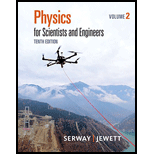
Concept explainers
Suppose a flutist plays a 523-Hz C note with first harmonic displacement amplitude A1 = 100 nm. From Figure 17.21b read, by proportion, the displacement amplitudes of harmonics 2 through 7. Take these as the values, A2 through A7 in the Fourier analysis of the sound and assume
Want to see the full answer?
Check out a sample textbook solution
Chapter 17 Solutions
Physics for Scientists and Engineers, Volume 2
- If a proton is located on the x-axis in some coordinate system at x0 = -3.2 x 10-5 meters, what is the x-component of the Electric Field due to this proton at a position x = +3.2 x 10-5 meters and on the x axis as the y-axis is 0 giving a number of Newtons/Coulomb?arrow_forwardConsider a single square loop of wire of area A carrying a current I in a uniform magnetic field of strength B. The field is pointing directly up the page in the plane of the page. The loop is oriented so that the plane of the loop is perpendicular to the plane of the page (this means that the normal vector for the loop is always in the plane of the page!). In the illustrations below the magnetic field is shown in red and the current through the current loop is shown in blue. The loop starts out in orientation (i) and rotates clockwise, through orientations (ii) through (viii) before returning to (i). (i) Ø I N - - I N - (iii) (iv) (v) (vii) (viii) a) [3 points] For each of the eight configurations, draw in the magnetic dipole moment vector μ of the current loop and indicate whether the torque on the dipole due to the magnetic field is clockwise (CW), counterclockwise (CCW), or zero. In which two orientations will the loop experience the maximum magnitude of torque? [Hint: Use the…arrow_forwardPlease help with calculating the impusle, thanks! Having calculated the impact and rebound velocities of the ping pong ball and the tennis ball calculate the rebounding impulse: 1.Measure the weight of the balls and determine their mass. Tennis ball: 0.57 kg Ping Pong Ball: 0.00246 kg The impulse, I, is equal to the change in momentum, Pf-Pi. Note the sign change, i.e., going down is negative and up is positive. The unit for momentum is kg-m/s. The change is momentum, impulse, is often givens the equivalent unit of N-S, Newton-Secondarrow_forward
- 5. Three blocks, each with mass m, are connected by strings and are pulled to the right along the surface of a frictionless table with a constant force of magnitude F. The tensions in the strings connecting the masses are T1 and T2 as shown. m T1 T2 F m m How does the magnitude of tension T₁ compare to F? A) T₁ = F B) T₁ = (1/2)F C) T₁ = (1/3)F D) T₁ = 2F E) T₁ = 3Farrow_forwardUsing Coulombs Law, what is the magnitude of the electrical force between two protons located 1 meter apart from each other in Newtons?arrow_forwardCalculate the magnitude of the gravitational force between 2 protons located 1 meter apart from each other in Newtons using Newton's Law of Universal Gravitation.arrow_forward
- If the metal sphere on the Van de Graff has a charge of 0.14 Coulombs and the person has a mass of 62 kg, how much excess charge would the person need in order to levitate at a distance 25 cm from the center of the charged metal sphere if there is a distance 25 cm from the person to the sphere using Coulomb's Law to calculate the electrical force. Give your answer as the number of Coulombs (with no unit label, as usual).arrow_forwardA balloon is rubbed on a sweater, giving the balloon a negative charge by adding an extra 3.9 x 107 electrons compared to its neutral state. What is the magnitude of the net charge on the balloon, in Coulombs?arrow_forwardA ping pong ball and a tennis ball are dropped and there is a very small gap between them when the tennis ball hits the floor. Indicate the directions of the momentums of the ping pong ball and the tennis ball after the tennis ball collides with the floor, but before the balls collide with each other. (Drawing a diagram may be helpful.)arrow_forward
- Describe how the momentum of a single ball changes as it free falls from a height of approximately 1 m, collides with a hard floor, and rebounds.arrow_forwardIf the answer is 2.8, -2.8 or -8.4, it is not CORRECTarrow_forwardThree blocks, light connecting ropes, and a light frictionless pulley comprise a system, as shown in the figure. An external force of magnitude P is applied downward on block A, causing block A to accelerate downward at a constant 2.5 m/s2. The tension in the rope connecting block B and block C is equal to 60 N. (a) What is the magnitude of the force P? (b) What is the mass of block C?arrow_forward
 Physics for Scientists and Engineers: Foundations...PhysicsISBN:9781133939146Author:Katz, Debora M.Publisher:Cengage Learning
Physics for Scientists and Engineers: Foundations...PhysicsISBN:9781133939146Author:Katz, Debora M.Publisher:Cengage Learning University Physics Volume 1PhysicsISBN:9781938168277Author:William Moebs, Samuel J. Ling, Jeff SannyPublisher:OpenStax - Rice University
University Physics Volume 1PhysicsISBN:9781938168277Author:William Moebs, Samuel J. Ling, Jeff SannyPublisher:OpenStax - Rice University Glencoe Physics: Principles and Problems, Student...PhysicsISBN:9780078807213Author:Paul W. ZitzewitzPublisher:Glencoe/McGraw-Hill
Glencoe Physics: Principles and Problems, Student...PhysicsISBN:9780078807213Author:Paul W. ZitzewitzPublisher:Glencoe/McGraw-Hill Principles of Physics: A Calculus-Based TextPhysicsISBN:9781133104261Author:Raymond A. Serway, John W. JewettPublisher:Cengage Learning
Principles of Physics: A Calculus-Based TextPhysicsISBN:9781133104261Author:Raymond A. Serway, John W. JewettPublisher:Cengage Learning An Introduction to Physical SciencePhysicsISBN:9781305079137Author:James Shipman, Jerry D. Wilson, Charles A. Higgins, Omar TorresPublisher:Cengage Learning
An Introduction to Physical SciencePhysicsISBN:9781305079137Author:James Shipman, Jerry D. Wilson, Charles A. Higgins, Omar TorresPublisher:Cengage Learning College PhysicsPhysicsISBN:9781938168000Author:Paul Peter Urone, Roger HinrichsPublisher:OpenStax College
College PhysicsPhysicsISBN:9781938168000Author:Paul Peter Urone, Roger HinrichsPublisher:OpenStax College





